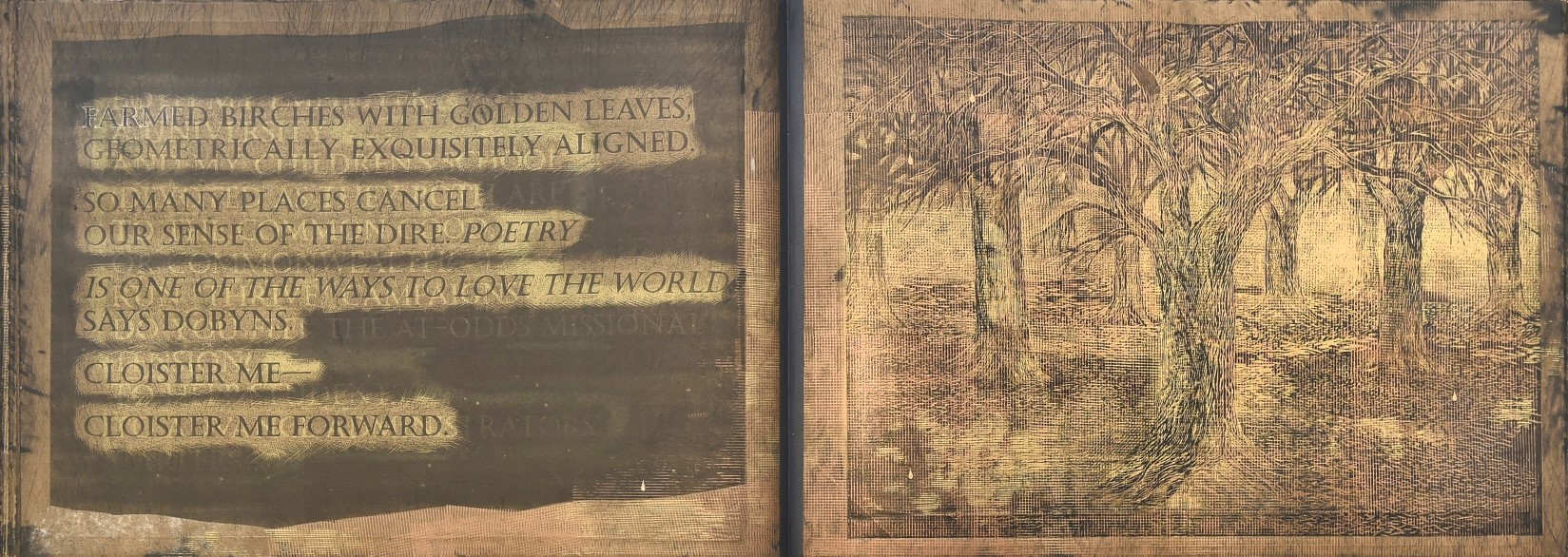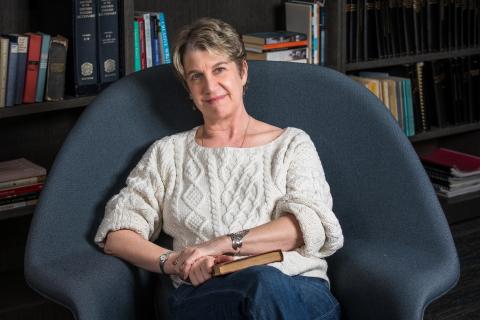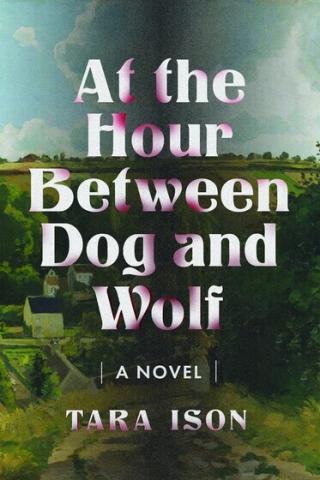Inspiration at twilight
An interview with Tara Ison
Assistant Professor Sarah Viren speaks with fellow creative writing faculty member – and fellow National Endowment for the Arts award-winner – Professor Tara Ison about Ison's new historical novel.
Sarah Viren: I want to start off by thanking you for writing such a narratively rich and politically urgent novel. I read most of it in a rush one weekend and have been thinking about it on and off ever since. Did you realize your novel would be so politically relevant when you first started working on it however many years ago?
Tara Ison: Not at all – I started working on this novel 25 years ago, and I was primarily interested in the psychology of identity, and the fragility and vulnerability of one’s sense of self when manipulated by extremist ideologies that weaponize terror and fear as a means of control. When the story begins, just pre-WWII, Danielle is a 12-year-old Jewish girl living a comfortable life in Paris with her parents; after the Nazi occupation begins, she is sent to live as a Catholic orphan in a farming village out in the country, and over the years – in order to feel safe – she loses herself in this false identity, repressing former memories of her family and faith and transforming into a devout Catholic, and an antisemitic fascist. I wanted to explore how someone could go from that A to that Z.
I’d put the novel down for a few years, and returned to it about 6 years ago – I was shocked to read passages I’d written five, ten, fifteen years earlier and realize my characters were espousing or experiencing the same antisemitic, xenophobic, fascist ideologies rising again to prominence in the world. So while not my intention, the novel is indeed explicitly political – at it’s core, it’s about how to turn people into fascists.
SV: Tell me about the title, "At the Hour Between Dog and Wolf." It feels like a metaphor for your protagonist’s evolution but also a subtle imperative to the reader to pay more attention to political and social changes afoot in our own world. What was your thinking behind your use of that French idiom to anchor this book?
TI: That title means a great deal to me; somewhere in my research I came upon the French phrase “entre chien et loup,” or “between dog and wolf,” an idiomatic expression for twilight, or dusk, and it just clicked. I love the poetry of it, but I also felt it perfectly spoke to the idea of psychological transformation, and the subtle changes and gradations through which that happens to a person. It also fit into the narrative quite easily, as my character, Danielle, remembers one afternoon early in the occupation of Paris:
- "Walking on slow Sunday afternoons until the sun began its drop, [Danielle and her father would] stop on the Pont Neuf, to watch the candles and lamplights twinkle on in the buildings.
Watch the colors change, Danielle, he’d say, pointing to the sky, look how beautiful. Look at all the shadings, always changing, from silvery lemon, over there, to that deep sapphire, look how it’s turning to ink. It’s like a painting. We’re ‘entre chien et loup’ at this hour. Now look carefully, and you show me the moment when day changes to night, when the light turns to dark. Can you see it?
And she’d look and look but could never see exactly when the shift happened, when the dog became the wolf. And that didn’t change, the twilight sky, just because the Germans were there.”
Originally it was simply “The Hour Between Dog and Wolf,” but the “At” adds a tone of narrative drama, I think – as you say, I hope it alerts the reader to kind of urgency.
SV: I understand that this novel was, as they say in the movies, inspired by real life, but then you used that inspiration to draft an emotionally rich and complicated narrative that is quite distinct from its real life counterpart. Can you talk a little about how you moved from that real life inspiration to the final, realized story?
TI: Yes, my stepmother was a hidden child in WWII Hungary, a 5-year-old Jewish girl sent to live on a farm with a Catholic family, under an assumed name, with a new identity. I was always haunted by her stories of being left by her terrified mother with this strange new “family,” being given a new name, taught the prayers of a new religion, coached in the lies to tell at school or when police came to the door. The stakes were so high—what goes on in the mind of a child like this? What if they were to get “lost” in their new identity? And what kind of person might this child ultimately become?
But this is not at all my stepmother’s story—my character goes from age 12 to 16, for a start. And I knew I didn’t want to set it in my stepmother’s Hungary/Czechoslovakia, because that world, history, and culture felt so distant from my knowledge at the time. I’ve always been a Francophile – I was fortunate to spend an undergrad year there on a Rotary scholarship – and I had a vague idea about the “Vichy Government that collaborated with the Nazis,” so I decided to set it in France. But as I researched, I realized I had little idea how that collaboration worked, what it really meant. The specific experience of living in occupied (but not “conquered,” as Vichy like to claim) France became absolutely essential to the book; the country itself undergoes a transformation of identity that mirrors what my character experiences.
SV: Your protagonist, Danielle, is arguably an anti-hero, a character about whom we as readers increasingly feel conflicted emotionally and intellectually. We hope for her success and survival, but we also begin to question what her success and survival might mean for others. Can you talk about the character of Danielle? Did you draw inspiration from any novels or films? (I kept thinking, for instance, of Walter White from "Breaking Bad").
TI: I love this way of looking at Danielle! I discuss with my students the difference between the “tragic hero” and the “anti-hero,” and I think Danielle has aspects of both: she very much wants to do the right, honorable, virtuous thing (tragic hero), but as her perspective on what’s happening around her becomes warped by the propaganda and indoctrination of the Nazi and Vichy regimes, she increasingly rationalizes evil by re-framing and re-defining a moral code so that she can justify her actions (anti-hero.) Similar to Walter White, who convinces himself what he’s doing is about taking care of his wife and children; another example would be Don Corleone, who explicitly announces he will do whatever he must to take care of his family. An anchor for me was the novel’s epigraph, the quotation from Alexander Solzhenitsyn: “To do evil, and human being must first believe that what he’s doing is good.” Pure evil doesn’t interest me – that makes for a comic book villain. I had to understand how and why Danielle convinces herself she doing good – and yes, I wanted the reader to feel uncomfortable and conflicted about their investment in this child as she changes.
SV: You teach a class at ASU on research-based fiction. What lessons on writing research-based fiction did you draw from writing this book? What, if at all, has teaching that course helped you realize about the role of research in fiction?
TI: That’s one of my favorite classes – there are such jewels to be found in research, from facts and figures that help shape the narrative, to metaphor and figurative language, to developing the character’s frame of reference and lens through which they view the world. My struggle with research is always the process of selection, because my instinct is to cram in absolutely everything I’ve learned. With this book, as with other novels I’ve written (and several of my short stories), I had to constantly ask myself: what is my character’s experience of this information? How does it impact them, directly or indirectly, logistically, emotionally, or psychologically? How does this information illustrate an aspect of the story’s theme? If I didn’t have a good answer to those questions, it got cut.
SV: What has writing this novel taught you about how to live in the world today? What do you hope it will teach readers?
TI: Writing this book I learned a lot – including how much privileged complacency I’ve gotten away with for so much of my life. Spending these past years in Vichy France, and seeing the parallels to what is being unleashed and encouraged in the world today, is overwhelming – I hope with this novel I might contribute in some small way to understanding how and why the empowerment of right-wing ideologies happens, and our moral responsibility to resist that force, in whatever way we can.
Thank you so much for reading the book, and inviting this discussion!
Image 1: Photo of Tara Ison by Charlie Leight/ASU.
Image 2: A cover image of Ison's book.


